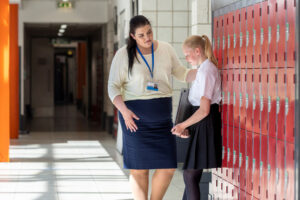Minnesota Links
How to Become a Minnesota School Counselor
For empathetic, extroverted people who are interested in having a job that makes a difference, becoming a school counselor is a great option.
Whether it’s in an elementary, middle, high school, or even college setting, school counselors are invaluable sources of emotional, academic, and social support for young people.
This role is ideal for professionals who are interested in pursuing counseling work and all that entails – close work with patients, careful listening, problem-solving – but who are curious to explore possibilities beyond one-on-one private practice or in clinical settings. School counselors are tightly woven into the fabric of a school’s community, connecting students, teachers, parents, and administrators as advocates for student success.
- Top Picks
Featured Universities with School Counseling Programs
#1
Walden University
MS in School Counseling - General Program. Click here to contact Walden University and request information about their programs.
#2
Campbellsville University
Online Master of Arts in Education in School Counseling Click here to contact Campbellsville University and request information about their programs.
#3
University of West Alabama
Master of Education: School Counseling & Education Specialist: School Counseling Click here to contact University of West Alabama and request information about their programs.
#4
Grand Canyon University
M. Ed in School Counseling (leads to initial Licensure) Click here to contact Grand Canyon University and request information about their programs.
#5
Sacred Heart University
Online Master of Arts in School Counseling Click here to contact Sacred Heart University and request information about their programs.
Becoming a School Counselor in Minnesota

In Minnesota, local school districts – generally called “Independent School Districts” – are overseen by the Minnesota Department of Education (MDE), but maintain a fair amount of autonomy when it comes to designing curricula. Still, the MDE has established a set of academic standards, which are updated every ten years.
In July 2024, the Minnesota legislature implemented SF 4669, a bill that mandates there be “one school counselor for every 250 children in prekindergarten or preschool programs and students in kindergarten through grade 12.” The bill also spells out expectations for school counselors in Minnesota, including:
- Working with students on goal setting and planning in school
- Direct assistance in the classroom focusing not only on academic work, but also “social and emotional, and postsecondary and career development” – including connecting at-risk students to the right resources in the event of mental health emergencies
- Offering both individual and group counseling to students on a temporary basis
In addition to fulfilling these expectations, school counselors in the Land of 1,000 Lakes can also find information and support via the Minnesota School Counselors Association. The Minnesota School Counselors Association, or MSCA, is a robust professional network offering both resources and community to individuals working in this field.
Where are you on your quest to become a Minnesota School Counselor?
Explore the information below and learn how you can become a school counselor in Minnesota. Some of the information in the following sections may be subject to change.
In order to make sure you have the most current information, please feel free to contact your school counseling education program advisor or contact the Minnesota Department of Education licensing department at (651) 582-8691.
I’m a High School Graduate…

If you’re interested in becoming a school counselor but didn’t complete higher education after high school, there’s a clear place to begin: pursuing an associate’s or bachelor’s degree.
It is not possible to become a school counselor with just a high school diploma.
In order to practice as a school counselor in Minnesota, in fact, you’ll need to be licensed, a professional qualification that requires a master’s degree and a certain amount of fieldwork hours – that means time spent in the field practicing this profession, building expertise and learning from mentors.
If you’re a recent high school graduate or did not get a bachelor’s or associate’s degree but are interested in this line of work, the following are recommended steps toward advancing your education to become a school counselor in Minnesota.
Step One: Apply to Associate’s or Bachelor’s Programs
Gather information from schools offering associate degree programs or bachelor degree programs in psychology, counseling, or any other type of program you are currently interested in. Significantly, it is not imperative you enroll in a counseling program at this point – though having a degree in a field related to school counseling, like psychology or social work, will likely be useful when the time comes to apply for master’s programs. At this stage, though, the most important thing is that you begin earning your associate’s degree or bachelor’s degree.
Step Two: Make Sure That This is What You’re Interested In!
A great way to find out if you are interested in a social service type of career like school counseling is to volunteer with organizations focused on helping children or young adults.
Not Sure Where to Start?
Not sure where to start? Some organizations that may be able to place you in volunteering positions across the state of Minnesota include:
Once you’ve completed these parts of the journey – deciding what you’re interested in, confirming that through volunteer opportunities, and completing an associate’s or bachelor’s degree program – you’ll be ready to move on to the next set of steps: becoming certified.
I have already earned a college degree…
Have you already completed a degree program? The following are the steps necessary for earning your school counseling certification in Minnesota after attaining a bachelor’s or associate’s degree:
Step One: Graduate School
As is the case in many mental health professions, a bachelor’s degree alone is generally not sufficient to begin practicing professionally. Instead, certified and licensed school counselors in Minnesota will generally need to have a Master’s degree in school counseling – or to complete a preparation program that’s been deemed a satisfactory replacement by the Minnesota Board of Teaching, as is specified below.
Either way, you’ll be expected to fulfill educational requirements through one of the following avenues:
- Earn a Master’s degree in School Counseling from an accredited school
- Earn a Master’s in any other field and then separately, complete a Board of Teaching preparation program leading to school counseling certification.
Step Two: Complete Fieldwork Hours
At this phase, the primary goal is to attain professional accreditation so that you may begin practicing in an academic environment. Most master’s programs in school counseling are aware of this, meaning that these pre-professional experiences – known as fieldwork hours – are a central part of the graduate school curriculum.
According to the Council for Accreditation of Counseling and Related Educational Programs (CACREP), aspiring school counselors should complete 100 hours of fieldwork as a practicum – that means a heavily-supervised role in school counseling typically conducted early on in a master’s program – and 600 hours (minimum) as an internship.
The school counseling internship is generally more in-depth and hands-on, preparing future counselors with direct experience, taking on more responsibility and practicing more independence. Again, graduate students in school counseling will generally complete both a practicum and an internship as part of their process of getting a master’s degree.
Step Three: Get a Background Check
You will need to complete a criminal history background check by requesting fingerprint cards from the Minnesota Department of Education. You will complete the fingerprinting process at a local police station or designated fingerprinting location.
Step Four: Fill Out the Application
You will find instructions for the application process and a link to Minnesota’s online application system here.
The application will have a contact phone number for questions, information about all that needs to be included in your application (transcripts, fees, etc.), and an address where the application will need to be sent.
I’m a certified counselor from another state…
If you’ve already completed the above steps but are from a different part of the US, Minnesota will need to evaluate your credentials to make sure your qualifications are comparable to the Minnesota school counseling certification requirements. It’s important to note that the National Association of State Directors of Teacher Education and Certification (NASDTEC) Interstate Agreements state that school counselors cannot simply transfer their credentials directly from one state to another – meaning that if, say, you’re licensed to practice in Texas, you can’t immediately get hired and begin practicing as a school counselor in Minnesota.
You will also have to request Minnesota Department of Education fingerprint cards in order to complete a background check. In some cases, you will be able to get a temporary license to practice in Minnesota while you work on transferring your credentials.
School counselors who are working on transferring their credentials may qualify for a Tier 2 license in Minnesota. For more information, call the Minnesota Department of Education at the following number: (651) 582-8691.
Frequently Asked Questions
What are the educational requirements to become a school counselor in Minnesota?
Broadly speaking, school counselors in Minnesota need to have a high school diploma, bachelor’s or associate’s degree, and a master’s degree. While it isn’t essential that a school counselor’s undergraduate education is in school counseling, it helps to have qualification in a related field, such as psychology or social work.
Is teaching experience required to become a school counselor in Minnesota?
No. Though school counselors work in educational settings and often closely collaborate with teachers and students alike, school counselors are not expected to have professional experience leading a classroom or designing a curriculum. Counseling experience – as demonstrated through the necessity of fieldwork hours in pursuing licensure and certification – is the most important thing.
Do I need a license to work as a school counselor in Minnesota? If so, what kind?
Yes. In order to practice as a school counselor in Minnesota, it is essential to have a state-issued license through the Professional Educator Licensing and Standards Board (PELSB). There are several different tiers of licenses available to school counselors (Tiers 2, 3, and 4) which are valid for different lengths of time. Generally speaking, school counselors who are just starting out will most likely pursue a Tier 2 license, which is valid for two years.
In order to pursue a Tier 3 or Tier 4 license as a school counselor in Minnesota, it’s necessary to complete a state-approved preparation program for school counseling. These programs may also be verified by the Council for the Accreditation of Counseling and Related Educational Services (CACREP).
How long does it take to become a licensed school counselor in Minnesota?
The length of time required to become a school counselor in Minnesota can vary from person to person. Broadly speaking, the process takes six or seven years: four years to complete a bachelor’s degree, followed by two to three years to complete a master’s degree.
Are there different requirements for working in different types of schools (i.e., elementary vs. high school)?
No, licensed Minnesota school counselors are qualified to work with grades K-12 without the need to complete additional requirements.
How much do school counselors typically earn in Minnesota?
In 2023, school counselors and school social workers in Minnesota earned, on average, between $64,830 and $68,510.
2023 US Bureau of Labor Statistics salary and employment figures reflect state data, not school-specific information. Conditions in your area may vary. Data accessed March 2025.